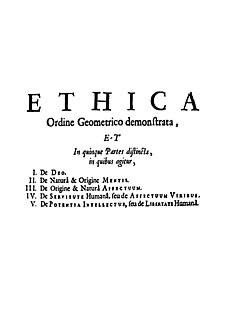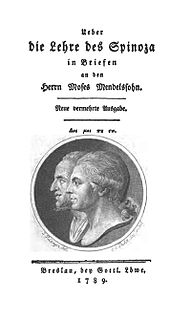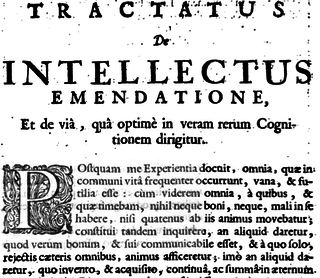Pantheism is the belief that reality is identical with divinity, or that all-things compose an all-encompassing, immanent god. Pantheist belief does not recognize a distinct personal anthropomorphic god and instead characterizes a broad range of doctrines differing in forms of relationships between reality and divinity. Pantheistic concepts date back thousands of years, and pantheistic elements have been identified in various religious traditions. The term "pantheism" was coined by mathematician Joseph Raphson in 1697 and has since been used to describe the beliefs of a variety of people and organizations.
In philosophy, rationalism is the epistemological view that "regards reason as the chief source and test of knowledge" or "any view appealing to reason as a source of knowledge or justification". More formally, rationalism is defined as a methodology or a theory "in which the criterion of the truth is not sensory but intellectual and deductive".
German idealism was a philosophical movement that emerged in Germany in the late 18th and early 19th centuries. It began as a reaction to Immanuel Kant's Critique of Pure Reason. German idealism was closely linked with both Romanticism and the revolutionary politics of the Enlightenment.
Naturalistic pantheism is a kind of pantheism. It has been used in various ways such as to relate God or divinity with concrete things, determinism, or the substance of the Universe. God, from these perspectives, is seen as the aggregate of all unified natural phenomena. The phrase has often been associated with the philosophy of Baruch Spinoza, although academics differ on how it is used.

Written by the Dutch philosopher Baruch Spinoza, the Tractatus Theologico-Politicus (TTP) or Theologico-Political Treatise was one of the most controversial texts of the early modern period. It was a preemptive defense of Spinoza's later work, Ethics, published posthumously in 1677, for which he anticipated harsh criticism.

Early modern philosophy is a period in the history of philosophy at the beginning or overlapping with the period known as modern philosophy.

Spinozism is the monist philosophical system of Benedict de Spinoza that defines "God" as a singular self-subsistent Substance, with both matter and thought being attributes of such.

Ethics, Demonstrated in Geometrical Order, usually known as the Ethics, is a philosophical treatise written in Latin by Benedict de Spinoza. It was written between 1664 and 1665 and was first published posthumously in 1677.
Jonathan Irvine Israel is a British writer and academic specialising in Dutch history, the Age of Enlightenment and European Jews. Israel was appointed as Andrew W. Mellon Professor in the School of Historical Studies at the Institute for Advanced Study, Princeton, New Jersey, in January 2001. He was previously Professor of Dutch History and Institutions at the University College London.
In early philosophies of psychology and metaphysics, conatus is an innate inclination of a thing to continue to exist and enhance itself. This "thing" may be mind, matter, or a combination of both. Over the millennia, many different definitions and treatments have been formulated. Seventeenth-century philosophers René Descartes, Baruch Spinoza, Gottfried Leibniz, and Thomas Hobbes made important contributions. The conatus may refer to the instinctive "will to live" of living organisms or to various metaphysical theories of motion and inertia. Often the concept is associated with God's will in a pantheist view of Nature. The concept may be broken up into separate definitions for the mind and body and split when discussing centrifugal force and inertia.
Steven Nadler is an American philosopher. He is the William H. Hay II Professor of Philosophy and Evjue-Bascom Professor in Humanities, and Max and Frieda Weinstein-Bascom Professor of Jewish Studies at the University of Wisconsin–Madison.

The pantheism controversy was an event in German cultural history that lasted between 1785–1789 which had an effect throughout Europe.
In philosophy and religion the passions are the instinctive, emotional, primitive drives in a human being which a human being must restrain, channel, develop and sublimate in order to be possessed of wisdom. Passions in religion and philosophy have a different connotation from the popular concept of passion which is generally seen as a positive emotion. The philosophical notion of passion, in contrast, is identified with innate or biologically driven emotional states regarded in ancient philosophies and the great religions as being the basis for deadly sins and seen as leading to various social and spiritual ills such as unstable relationships, broken marriages, lack of social integration, psychological disorders and other problems. In the philosophical tradition of the west passion is often placed in opposition to reason. Reason is advocated in the control of passion, something seen as desirable and necessary for the development of a mature, civilized human being. This is achieved by the cultivation of virtue. Four virtues in particular have long been seen as of especial value in this regard.

Tractatus de Intellectus Emendatione (TIE) or On the Improvement of the Understanding is a seventeenth-century unfinished work of philosophy by the 17th century philosopher Baruch Spinoza, published posthumously in 1677.

Spinoza's philosophy encompasses nearly every area of philosophical discourse, including metaphysics, epistemology, political philosophy, ethics, philosophy of mind, and philosophy of science. It earned Spinoza an enduring reputation as one of the most important and original thinkers of the seventeenth century.

Spinoza is a book about Baruch Spinoza by the English philosopher Stuart Hampshire, in which the author introduces Spinoza's philosophy, comparing Spinoza's views to those of other philosophers such as René Descartes and Gottfried Wilhelm Leibniz, as well as to those of Sigmund Freud, the founder of psychoanalysis. The work includes a foreword by the philosopher A. J. Ayer, while a new introduction was added to the 1987 edition. Spinoza has become a classic work about Spinoza and has received praise from philosophers. However, Hampshire's comparisons between Spinoza and Freud have been criticized for ignoring important differences between the two. In 2005, Spinoza, along with Hampshire's other writings on the philosopher, was incorporated into a single volume, published as Spinoza and Spinozism, which received negative reviews.

Expressionism in Philosophy: Spinoza is a 1968 book by Gilles Deleuze, in which the author conceives Baruch Spinoza as a solitary thinker who envisioned philosophy as an enterprise of liberation and radical demystification. Deleuze carries out the following investigations in this book: He sees how the univocity of Being fits into the theory of substance. He also looks into the relationship between the theory of ideas and the production of truth and sense, the organisation of affect to achieve joy, and the organization of affect in the theory of modes.











